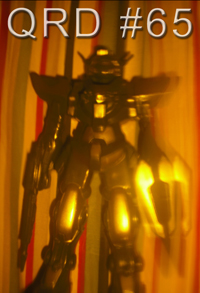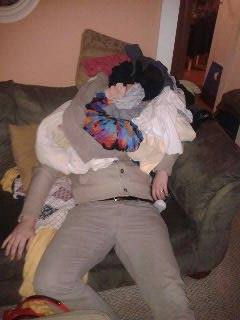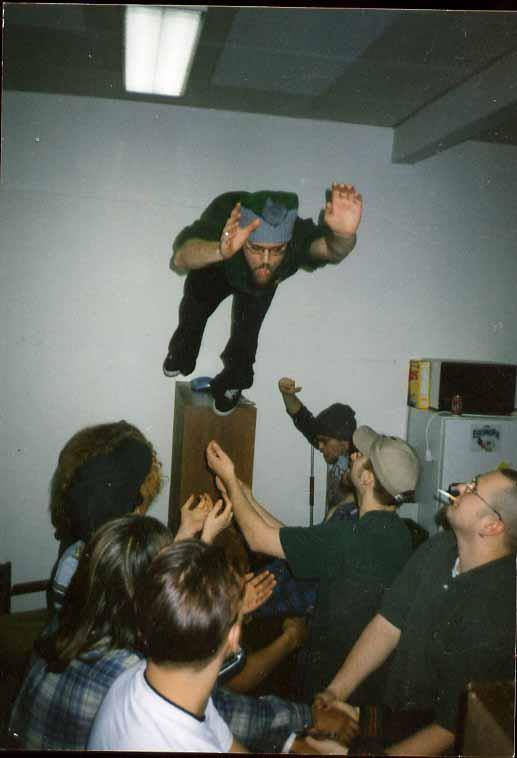
October 2013

QRD – Do you think the term “noise” is the most appropriate one for the music you make?
Carl – Depends. Most sounds I utilize are non-musical, arranged without consideration of tempo or melody in non-verse/chorus/verse constructions; so, yes the argument for noise music is there to be made. On the other hand, harsh noise purists might refer to me as a “sound artist”. Of the 50 releases (albums, EPs, miscellaneous) listed at Discogs.com under my name, the divide is about 60/40, favoring “pure sound” to harsh noise. Releases of mine under various aliases & collab projects are 80/20 in favor of harsh noise. Some call it sound art or musique concrete or even industrial (a la Throbbing Gristle), but like “rock”, or the even more ubiquitous “world music”, “noise” is an umbrella term - maybe even a gentrified one by this point. Generally speaking, anything I make would be at home at a noise show.
QRD – Your blog The Static Fanatic shares a lot of music for free. What are your personal thoughts on copyright & the value of music?
Carl – The Static Fanatic was started to share my personal rips & rare web finds with a few friends of similar tastes in noise/noise related music. Much of what I post are merch table buys, copies from the artists themselves, or just stuff other people have ripped & sent me. For those unfamiliar with my blog, I deal with mostly CD-Rs & tapes, most of which were hand made & numbered by the labels & artists themselves, always in very small editions (the average range 30-50 copies per edition). Due to the obscurity of the artists & labels represented on the blog, I refer to them as the sub-underground.
The question of value in music is intrinsic to the culture it is a mirror of, & defies being defined in solely monetary terms. In regards to artists & labels I post, I suspect copyright is more important to those who stand to lose what they view as control over the presentation of their product, as opposed to the prospect of simply losing money - if you are putting out noise releases in editions of 40, the assumption is profit (in the sense of getting more out of it them put in) isn’t exactly a huge concern. That said, I don’t preorder albums to rip & share once they are officially released (some blogs do & that’s they’re business), much of what I chose to post are out of print in that they are no longer available from their labels. If artists or labels don’t want their work posted, it is removed. Any blog I am aware does this - we are all keenly aware of the fact that free blogs operate in a grey area legally. More importantly, the blog is a resource for everyone involved in it, namely the regular visitors. . The post-Napster internet has complicated the relationship between producer & consumer in ways beyond the “people want free stuff” refrain of detractors - the brilliant “Collaterals Damage” series of articles published by Wire magazine have shed light on this new condition. I recommend anyone interested in the topic of copyright in the digital age read them. On a related note, distributors & label heads are among the biggest downloaders I’ve encountered...
QRD – What’s the job of a record label today that a band can’t do on their own?
Carl – The record labels I deal with are mostly DIY of the highest order & smallest size. This seems to be a question better suited for a proper rock band looking to make a “go at it” in the sense of touring & signing their creative efforts away to a label. I release noise tapes & CD-Rs relatively no one will hear in comparison to a band on a label of any size.
QRD – You do a lot of work booking experimental music in Wilmington. What do you do to try to get new blood into such a small community?
Carl – I do my best to make bills with artists that compliment one another. This keeps the artists & audience enthused & engaged. Due to its location (& lack of reputation) Wilmington can be a hard sell for some artists.
QRD – Do you think experimental & noise music work better live or recorded?
Carl – In the right hands & to the right ears, both sound great live & recorded. The argument is made for noise being more of an “in the moment” approach to performing, but the same can be said for non-noise. It’s really no different from probably 95% of all “proper” music. As weird as noise/experimental music are in relation to blues or rock or Chicago style polka, its dynamics are similarly affected by how one experiences it & saying its best when filling a room full of sound as opposed to a pair of headphones doesn’t give intense listeners enough credit. Noise/experimental music is said to require a sense of deep listening, so whether that’s live or not is immaterial.
QRD – Both your wife & daughter are involved with some of your projects. How into weird music are they when you aren’t around?
Carl – I am usually around… but when I am not… *shockingly* they’re probably not very much into the weird music. My wife is a little. She’ll cue a harsh noise track at the gas station when the garden variety frat boy doucher at the next pump is blasting Drake or whatever auto-tuned garbage is hot for the 18-22 demo that week.
QRD – I know you’ve been on & off underemployed the past few years. How has that effected your creative output?
Carl – Not having had a job for a few months last year incidentally coincided with a bunch of compilation invites & collab projects being finished that gave the impression that I was super busy due to an abundance of free time. That wasn’t entirely the case. I’ve always stayed busy with composing. I just sit & work. Currently I have more projects & pending releases, local & via the net, than I can account for (roughly a dozen, maybe more).
QRD – How has Squidco effected Wilmington?
Carl – Squidco is a brick & mortar record store specializing in experimental music, with an emphasis on free jazz, that relocated here from NYC a few years back. The owner, Phil, is very keen on putting together live showcases of traveling artists as well as local & regional artists. Since most of the business is done online, he’s in contact with artists from around the world who’ve expressed interest in playing at the store, despite the limited draw of Wilmingtonian crowds. By now, world class talent such as Jap Blonk, Chris Corsano, Endangered Blood (feat Trevor Dunn of the Melvins), Tatsuya Nakatani, Paal Nissen-Love, & Frode Gjerstad have performed there. Naturally, the smattering of weird music aficionados in Wilmington (many of us having been associated with the 910 Noise Collective) have been incredibly grateful for the good fortune of having this unique establishment set up shop in our back yards. The cultural landscape of the city has been positively affected by Squidco, too. Squidco shows are often chosen as “gigs of the week” in the local media, which often include interviews with the artists.
QRD – What’s your relationship to the guitar as an instrument?
Carl – I don’t consider myself a guitarist. To me, the guitar is an instable device that often makes up its own mind. I like that. Chance is a huge motivator for me. Experimental music on guitar appeals to me in that it reverses the aggressively phallic ethos of rock guitar. I am always down for destroying rock & roll. My favorite guitar based compositions were actually processed samples of a few broken & unstrung guitar strings I rubbed against a contact mic. The ensuring album of material, “Feed FWD”, was released on noise luminary Andrew Coltrane’s Hermitage Tapes label, which has been my highest profile release, thus far.
QRD – What do you currently use to record & what are some benefits & deficits of the different things you’ve used to record over the years?
Carl – I record onto my phone & email it to myself. The files are of a slightly diminished sound quality, but I like working within limited parameters. I also line-in to a couple of tape players & boom boxes I own. Often people will record onto nicer devices, like a Zoom recorder, & mail it to me. I used a four track to record a series of albums based on no-input mixer feedback. I used to record everything directly onto my soundcard on my old PC, which was probably my favorite way of doing it. I’d open Cool Edit Pro, hit record & jam. I am personally not an audiophile & have pretty much been into low intensity DIY production since recording my sister & I goofing around as little kids on our Fisher Price tape decks. These approaches have no drawbacks to me. I work in a very direct manner, part of which is because of my financial situation, namely I work with what I have or scrounge & make the best of it. In the time it takes to set up/fuss over a proper recording environment, I’d rather have been playing.
QRD – How much foreknowledge do you have of a piece before recording (or performing) it & how much is improvised?
Carl – Like I previously stated, chance plays a big role in what I do. Depending on the overlaying concepts of the show or piece I am performing/composing, there is sometimes a framework of where I might take a piece. This is usual for improvisers, although most of what happens ultimately ends up leading itself, most of the time.
QRD – Anything else?
Carl – Sound as an experience freed from music is amazing.










